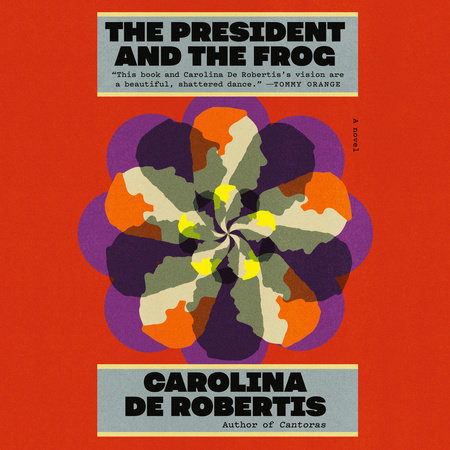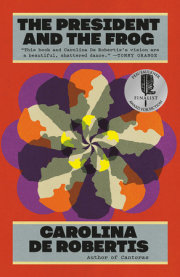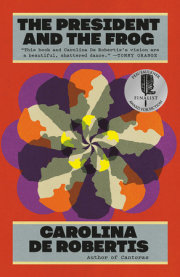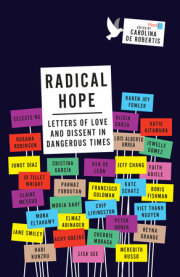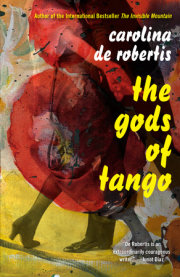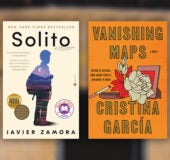Once upon a time, in a near-forgotten country, on a certain mid-November afternoon, an old man sat at his kitchen table and listened for the world beyond. No cars, not yet, only a breeze rattling the windowpane and the song of a single stubborn thrush. The reporters would be here any moment, with their arms full of equipment and their heads full of questions, looking the way reporters usually did in the old man’s house: amazed, disoriented, as if they’d just landed in some unmapped corner of the planet. As if it were some miracle, him in a ramshackle home, as if—and this was the part that tickled him most—as if he were a normal man. It was strange, how stunned they were, no matter how thoroughly they’d researched and prepared, no matter how much they already knew about the so-called Poorest President in the World, a man who’d led his country while living in a place, well, like this, could it be true, this house right here, there must be some mistake, they’d pulled up to the wrong gate, it couldn’t have been these four walls that he chose over the Presidential Palace, how could anyone run a country from a humble farmhouse at the edge of town, more hut than house by the standards of some of the countries from which they’d flown; why would anyone even attempt to lead from such a place, why for that matter would anyone donate more than half their salary to charity, especially as president. There had to be a reason other than what the public had heard so far. And so they often opened with questions about it, tinged with disbelief as well as an amusing kind of hubris, as if they really thought they were the first to ask, as if by asking they could dig up some truth so buried it had never seen the sun.
A common first question was why? Why live the way you do?
There had been so many interviews throughout the presidency, and even now that it was over. He’d thought it would abate once his term ended, but the requests had not let up. He’d had to become more discerning, but still, he wouldn’t stop. Not yet. Not until he had to. Because there was so much, always, left to do. He watched a few specks of dust dance in a slant of light, just above the cluttered kitchen counter. So much dust. He’d wiped all the counters this morning—not under all the jars and bottles and cups that congregated exuberantly there, but still, he’d wiped around them, and he’d swept the slightly uneven floorboards, yet here they were again, specks of dust, floating languidly as if time belonged to them.
An engine outside. He approached the front door. Yes, there they were, out at the gate. A van. Two of them this time, a man and a woman, from Germany, or was it Sweden, he couldn’t remember now, his calendar was so full they’d all started to bleed together and in any case a welcome to them all. These two seemed young, limber, they were busy disembarking and gathering equipment and hadn’t yet seen him in the doorway. The spring air was lovely, the warmest so far, that kind of November sun that flirts with your skin, coy about the summer to come. A good day for an interview in the garden. He’d suggest the garden, politely, but really that was the only place; usually, with two of them and the camera to set up on a stand, there wasn’t enough space in the combined kitchen and attached living room, and anyway they were never satisfied by the interior light, no sweeping vistas here, ha, not even close, nothing like the majestic windows and fancy molding in the official Presidential Residence of his own country, or of countries he’d visited as head of state, but despite that or, more accurately, for that very reason, he knew they’d want to see the inside of his house and get their own footage, direct images of—look, can you believe it, breaking news—the way an old man lives, and really, he thought to himself, regardless of what they say that’s all you are, an old man.
The reporter said something to the cameraman, then looked up and caught the ex-president’s eye. She smiled with genuine pleasure and waved. She was wearing sneakers, no high heels, a sensible and poised woman in her early forties perhaps, older than the cameraman with his broad shoulders and shaggy hair and a look about him like one of those surfer types who seemed to always long for the bobbing waves while she looked more like, say, an elementary school principal, warm and eagle-eyed. There were interviews and then there were interviews, and this reporter, he realized, watching her start up the path toward him, would not be one of the predictable ones who lingered in the shallows. She might not be the kind to start with that common question, the one about the house, the way he lived, that Why. She might start at the end, or in the middle, with the disastrous recent election in North America, a catastrophe only just beginning to send its ripples into the world along with questions surely on the tips of many journalists’ tongues, such as how the hell do we carry on? what will it mean? what now?—or maybe she’d start all the way back in prehistoric times, his guerrilla years, his prison years, perhaps that other popular question, which was how? How did you survive it and become, well, ehm, you? A kind of dive right into deeper waters, she’d be capable of that, the smart ones often took that route, thinking it gave them more time to burrow around the ocean floor in search of secrets to pry open. As if secrets were the pearls inside of oysters, held in crusty shells and he himself was a crusty old geezer after all, so why not. They fancied themselves pearl divers, the kind you read about in other countries who knifed down and tapped on shell after shell. There was a name for them, what was it, he couldn’t remember, not the first word to slip his mind this week, damn it, but what could he do, at least he was still sharp enough for a lot of things and, in any case, whatever they were called that was how they did it, the pearl people, tapping with their fingertips, while reporters went about it with their questions.
Tap tap, what’s in there.
He didn’t want to be tapped at anymore, not today, he thought with a hint of panic, which startled him, because what did it matter, he knew how to do this, he could do it in his sleep, and anyway there was nothing special to be found, was there? What secrets could this German-or-Swedish-maybe woman walking toward him be after? What could be left to pry open in him? Surely she knew better than to think she could uncover something new.
He was done with all that.
He’d been baring himself for years now.
He was eighty-two years old, full of creaks and aches and bullet wounds that itched with the turning of the weather. He’d told all his stories and answered all the questions, he had a reputation as a man who loved to talk and it was true, he’d talked and talked throughout these recent years, these presidential years, about the old days, the new days, the yet-to-come-what-will-we-see days, he’d spoken more words than he’d have thought possible in a single lifetime. When he was a little boy, he used to imagine that somewhere in heaven (for this imagining took place in that very early period when he still believed a heaven could exist) a vast crowd of majestic registers counted all the words spoken by every human being in the world, that every time a child was born a new register appeared gleaming among the rows, and all you had to do to see the sum of your life’s speech was reach that heavenplace and find the beautiful machine that bore your name, like one of those old-fashioned cash registers that ring cheerily when you feed them or take anything away, only glowing, and instead of showcasing the number of pesos in its little window, it displayed the total of your spoken words. It would spool out every syllable you’d ever uttered on a bright, kilometers-long receipt. Well. If such a place existed, he’d surely have the longest spool of anyone alive. Yes, there were the lonely years of silence, but damn, since then he’d really made up for lost time. What a kick it would be to see the number on his personal word-register in the ether. It amazed him now, his childish faith that the universe would bother to preserve such elaborate records of people’s spoken lives. Even if it could, why would it bother? Naturally, he’d learned as he grew up that the opposite was true: most human speech went unrecorded, unregistered, even today in the era of gadgets everywhere to document your sounds, and certainly there was no such thing as what he’d imagined, no gathering of heavenly contraptions, no spooling notes, no system of preservation. If anything, the forces of the world leaned toward erasure. There was nothing except people, their voices, and the air that held them, with time’s river sweeping over it all.
Still. Not all speech dissolved. And even when it did, it wasn’t nothing. He’d heard people say talk was cheap, but that wasn’t true. Talk was magic, it turned the world, it was power when you knew how to fuse it with what mattered and pull your actions taut inside it like arrows.
Talk had made him what he was. Talk was his unique gift and his inheritance: he was born to a nation of talkers, a nation where you stopped by for a minute and stayed for hours, chatting over wine or whiskey or yerba mate. Conversation threads and weaves the world. This was an element some foreign reporters didn’t understand; they rushed through their list of questions and didn’t know how to deepen into the rhythms of exchange. Some reporters showed up so starry-eyed or bent on their own ends that it was clear from the beginning they would only go so deep, so the ex-president kept them on the surface and sent them on their way. Most of the time, when that happened, the reporters seemed content. This woman, though, already seemed different, he could tell just from her gait as she walked up the path; she seemed to have the listening gift, which would make for a different kind of interview, the thought of which, in fact, gave him a sense of the ground falling beneath his feet—though he didn’t show it on the outside, trained revolutionary that he was—and what was it, anyway, this shaking inside, it wasn’t fear exactly but something else, the prick of temptation, the possible tapping at shells that might want to creak open after all, because who was he kidding, why pretend, of course he still had places that were shut inside and had not yet been poked and found, buried secrets no interview had touched, of course he had parts of the long story he’d never really told no matter how many thousands of interviews he’d given so far, obviously he did, how else could it be, now come on, would an old guerrilla like him really lay it all bare? Sure, he laid it bare, he told it all, he’d been the most honest president in the world, infamous for saying whatever popped into his mind as long as it was true, but even so, he had layers and then more layers, as did any human being. There were intimate versions of your own story you did not give the world. The deeper ones; the strange ones; the ones you yourself drew life from but did not quite fully understand. And that was the problem with the listening gift: it widened the whole channel, and next thing you knew you were waxing on, you were roaming out, you didn’t know what you’d say next or what would crack open. The woman was in front of him now, holding out her hand to shake in that First World way, her face warm, her cameraman just behind her. To his absolute surprise, the ex-president felt the past rise inside him with a roaring fullness, and even though he knew he wouldn’t tell it—he’d never told it, would never tell it, knew it couldn’t be conveyed in words—he felt it push alive in him, that closed-up secret, that deepsea story from forty years ago, the one that could answer half their questions in one swoop, the story of the frog.
Copyright © 2021 by Carolina De Robertis. All rights reserved. No part of this excerpt may be reproduced or reprinted without permission in writing from the publisher.

